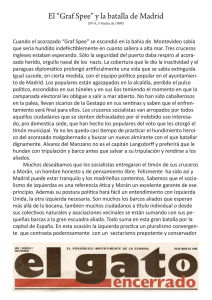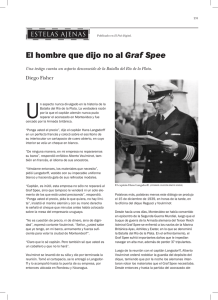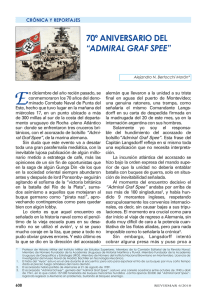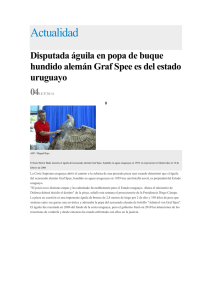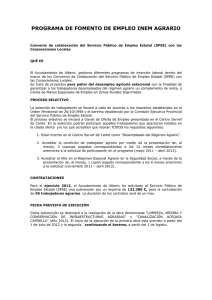La Batalla del Río de La Plata The Battle of the River Plate
Anuncio
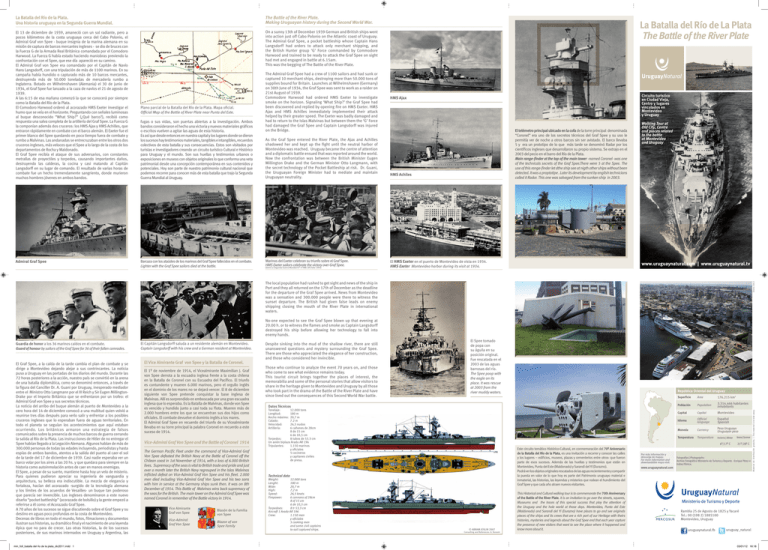
La Batalla del Río de la Plata. Una historia uruguaya en la Segunda Guerra Mundial. The Battle of the River Plate. Making Uruguayan history during the Second World War. El 13 de diciembre de 1939, amaneció con un sol radiante, pero a pocos kilómetros de la costa uruguaya cerca del Cabo Polonio, el Admiral Graf von Spee - buque insignia de la marina alemana en su misión de captura de barcos mercantes ingleses - se dio de bruces con la Fuerza G de la Armada Real Británica comandada por el Comodoro Harwood. La Fuerza G había estado haciendo maniobras previendo la confrontación con el Spee, que ese día apareció en su camino. El Admiral Graf von Spee era comandado por el Capitán de Navío Hans Langsdorff, con una tripulación de más de 1100 marinos. En su campaña había hundido o capturado más de 10 barcos mercantes, destruyendo más de 50.000 toneladas de mercadería rumbo a Inglaterra. Botado en Wilhelmshaven (Alemania) el 30 de junio de 1934, el Graf Spee fue lanzado a la caza de navíos el 21 de agosto de 1939. A las 6:15 de esa mañana comenzó la que se conocerá por siempre como la Batalla del Río de la Plata. El Comodoro Harwood ordenó al acorazado HMS Exeter investigar el humo que se veía en el horizonte. Preguntando con señales luminosas al buque desconocido “What Ship?” (¿Qué barco?), recibió como respuesta una salva completa de la artillería del Graf Spee. La Fuerza G la componían además dos cruceros: los HMS Ajax y HMS Achilles, que entraron rápidamente en combate con el barco alemán. El Exeter fue el primer blanco del Spee quedando en poco tiempo fuera de combate y rumbo a Malvinas. Las andanadas se entrecruzaban entre los otros dos cruceros ingleses, más veloces que el Spee a lo largo de la costa de los departamentos de Rocha y Maldonado. El Graf Spee recibía el ataque de sus adversarios, con constantes metrallas de proyectiles y torpedos, causando importantes daños, destruyendo las calderas, la cocina y casi matando al Capitán Langsdorff en su lugar de comando. El resultado de varias horas de combate fue un hecho tremendamente sangriento, donde murieron muchos hombres jóvenes en ambos bandos. On a sunny 13th of December 1939 German and British ships went into action just off Cabo Polonio on the Atlantic coast of Uruguay. The Admiral Graf Spee, a pocket battleship whose Captain Hans Langsdorff had orders to attack only merchant shipping, and the British Hunter group ‘G’ Force commanded by Commodore Harwood and trained to be ready to attack the Graf Spee on sight had met and engaged in battle at 6.15am. This was the begging of The Battle of the River Plate. Admiral Graf Spee Plano parcial de la Batalla del Río de la Plata. Mapa oficial. Official Map of the Battle of River Plate near Punta del Este. fugas o sus vidas, son puertas abiertas a la investigación. Ambos bandos consideraron el hecho una victoria y nuevos materiales gráficos o escritos vuelven a agitar las aguas de esta historia. Es así que desde entonces en nuestra capital y los lugares donde se dieron los sucesos hay testimonios materiales, tangibles e intangibles, recuerdos colectivos de esta batalla y sus consecuencias. Estos son visitados por turistas e investigadores creando un circuito turístico Cultural e Histórico para Uruguay y el mundo. Son sus huellas y testimonios urbanos o exposiciones en museos con objetos originales lo que conforma una veta patrimonial desde una concepción contemporánea en sus contenidos y potenciales. Hoy son parte de nuestro patrimonio cultural nacional que podemos recorrer para conocer más de esta batalla que trajo la Segunda Guerra Mundial al Uruguay. Barcaza con los ataúdes de los marinos del Graf Spee fallecidos en el combate. Lighter with the Graf Spee sailors died at the battle. The Admiral Graf Spee had a crew of 1100 sailors and had sunk or captured 10 merchant ships, destroying more than 50.000 tons of supplies bound for Britain. Launches at Wilhelmshaven (Germany) on 30th June of 1934, the Graf Spee was sent to work as a raider on 21st August of 1939. Commodore Harwood had ordered HMS Exeter to investigate smoke on the horizon. Signaling ‘What Ship?’ the Graf Spee had been discovered and replied by opening fire on HMS Exeter. HMS Ajax and HMS Achilles immediately implemented their attack helped by their greater speed. The Exeter was badly damaged and had to return to the Islas Malvinas but between them the ‘G’ Force had damaged the Graf Spee and Captain Langsdorff was injured on the Bridge. As the Graf Spee entered the River Plate, the Ajax and Achilles shadowed her and kept up the fight until the neutral harbor of Montevideo was reached. Uruguay became the centre of attention and a diplomatic battle ensued that was reported around the world. Now the confrontation was between the British Minister Eugen Millington Drake and the German Minister Otto Langmann, with the secret technology of the Pocket Battleship at risk. Dr. Guani, the Uruguayan Foreign Minister had to mediate and maintain Uruguayan neutrality. Marinos del Exeter celebran su triunfo sobre el Graf Spee. HMS Exeter sailors celebrate the victory over Graf Spee. (Serie La Segunda Guerra Mundial N º 9 TIME LIFE folio 1995) La Batalla del Río de La Plata The Battle of the River Plate Circuito turístico en Ciudad Vieja, Centro y lugares vinculados en Montevideo y Uruguay HMS Ajax El telémetro principal ubicado en la cofa de la torre principal denominada “Coronel” era uno de los secretos técnicos del Graf Spee y su uso le permitía ver de noche a otros barcos sin ser avistado. El barco llevaba 5 y era un prototipo de lo que más tarde se denominó Radar por los científicos ingleses que desarrollaron su propio sistema. Se extrajo en el 2003 del pecio en el barro del Río de la Plata. Main range-finder at the top of the main tower -named Coronel- was one of the technicals secrets of the Graf Spee.There were 5 at the Spee. The use of this range-finder let dthe ship see at nigth other ships without been detected. It was a proptotipe . Later its development by english technicians called it Radar. This one was salvaged from the sunken ship in 2003. HMS Achiles El HMS Exeter en el puerto de Montevideo de vista en 1934. HMS Exeter Montevideo harbor during its visit at 1934. Walking Tour at Old City, Centre and places related to the battle at Montevideo and Uruguay www.uruguaynatural.com | www.uruguaynatural.tv Enero 2012 The local population had rushed to get sight and news of the ship in Port and they all returned on the 17th of December as the deadline for the departure of the Graf Spee arrived. News from Montevideo was a sensation and 300.000 people were there to witness the sunset departure. The British had given false leads on enemy shipping closing the mouth of the River Plate in international waters. No-one expected to see the Graf Spee blown up that evening at 20.00 h. or to witness the flames and smoke as Captain Langsdorff destroyed his ship before allowing her technology to fall into enemy hands. El Graf Spee, a la caída de la tarde cambia el plan de combate y se dirige a Montevideo dejando alejar a sus contrincantes. La noticia puso a Uruguay en las portadas de los diarios del mundo. Durante las 72 horas posteriores a la acción, nuestro país se convirtió en la arena de una batalla diplomática, como se denominó entonces, a través de la figura del Canciller Dr. A. Guani por Uruguay, inesperado mediador entre el Ministro Otto Langmann por el III Reich y Sir Eugen MillingtonDrake por el Imperio Británico que se enfrentaron por un trofeo: el Admiral Graf von Spee y sus secretos técnicos. La noticia del arribo del buque alemán al puerto de Montevideo a la cero hora del 14 de diciembre convocó a una multitud quien volvió a reunirse tres días después para verlo salir y enfrentar a los posibles cruceros ingleses que lo esperaban fuera de aguas territoriales. En todo el planeta se seguían los acontecimientos que aquí estaban ocurriendo. Los británicos armaron una estrategia de falsos comunicados sobre la presencia de muchos barcos de guerra cerrando la salida al Río de la Plata. Las instrucciones de Hitler de no entregar el Spee habían llegado a la Legación Alemana. Algunos hablan de más de 300.000 personas de todas las edades incluyendo, periodistas y hasta espías de ambos bandos, atentos a la salida del puerto al caer el sol de la tarde del 17 de diciembre de 1939. Casi nadie esperaba ver un barco volar por los aires a las 20 hs. y que quedara para siempre en la historia como autoinmolación antes de caer en manos enemigas. El Spee, a pesar de su suerte, mantiene hasta hoy un velo de misterio. Para quienes pudieron apreciar su ingeniería de vanguardia y arquitectura, su belleza era indiscutible. La mezcla de elegancia y fortaleza, hacían del acorazado -surgido de la tecnología alemana y los límites de los acuerdos de Vesailles- un buque tan poderoso que parecía ser invencible. Los ingleses denominaron a este nuevo diseño “pocket battleship” (acorazado de bolsillo) y la gente empezó a referirse a él como: el Acorazado Graf Spee. A 70 años de los sucesos se sigue discutiendo sobre el Graf Spee y su destino en aguas poco profundas en la costa de Montevideo. Decenas de libros en todo el mundo, fotos, filmaciones y documentos ilustran sus historias, su dramático final y el nacimiento de una leyenda épica que no para de crecer. Las otras historias, la de los sucesos posteriores, de sus marinos internados en Uruguay y Argentina, las min_foll_batalla del río de la plata_dic2011.indd 1 El Capitán Langsdorff saluda a un residente alemán en Montevideo. Captain Langsdorff with his crew and a German resident at Montevideo. El Vice Almirante Graf von Spee y la Batalla de Coronel. El 1º de noviembre de 1914, el Vicealmirante Maximilian J. Graf von Spee derrota a la escuadra inglesa frente a la costa chilena en la Batalla de Coronel con su Escuadra del Pacífico. El triunfo es contundente y mueren 6.000 marinos, pero el orgullo inglés en el dominio de los mares no se dejará vencer. El 8 de diciembre siguiente von Spee pretende conquistar la base inglesa de Malvinas. Allí es sorprendido en emboscada por una gran escuadra inglesa que lo esperaba. Es la Batalla de Malvinas, donde von Spee es vencido y hundido junto a casi toda su Flota. Mueren más de 2.000 hombres entre los que se encuentran sus dos hijos como oficiales. El combate devuelve el dominio inglés a los mares. El Admiral Graf Spee en recuerdo del triunfo de su Vicealmirante llevaba en su torre principal la palabra Coronel en recuerdo a este suceso de 1914. Vice-Admiral Graf Von Spee and the Battle of Coronel 1914 The German Pacific Fleet under the command of Vice-Admiral Graf Von Spee defeated the British Navy at the Battle of Coronel off the Chilean coast in 1at November of 1914, with a loss of 6.000 British lives. Supremacy of the seas is vital to British trade and pride and just over a month later the British Navy regrouped in the Islas Malvinas inflicted defeat on Vice-Admiral Graf Von Spee and his fleet. 2.000 men died including Vice-Admiral Graf Von Spee and his two sons with him in service at the Germany ships sunk then. It was on 8th December of 1914. This Battle of Malvinas wins back supremacy of the seas for the British. The main tower on the Admiral Graf Spee was named Coronel in remember of the Battle victory in 1914. Vice Almirante Graf von Spee Blasón de la Familia von Spee Vice-Admiral Graf Von Spee Blazon of von Spee Family Despite sinking into the mud of the shallow river, there are still unanswered questions and mystery surrounding the Graf Spee. There are those who appreciated the elegance of her construction, and those who considered her invincible. Those who continue to analyze the event 70 years on, and those who come to see what evidence remains today. This tourist circuit brings together the places of interest, the memorabilia and some of the personal stories that allow visitors to share in the heritage given to Montevideo and Uruguay by all those who took part in the drama of the Battle of the River Plate and have since lived out the consequences of this Second World War battle. El Spee tomado de popa con su águila en su posición original. Fue rescatada en el 2003 de las aguas barrosas del río. The Spee poop with the eagle on its place. It was rescue at 2003 from the river muddy waters. República Oriental del Uruguay Datos Técnicos Tonelaje: 12.000 tons Longitud: 180 m Ancho máximo: 20,7 m Calado: 7.2 m Velocidad: 26,5 nudos Artillería: 6 cañones de 28cm 8 de 15 cm 6 de 10,5 cm Torpedos: 8 tubos de 53.3 cm Un avión biplaza Arado AR 196 Tripulantes: 1.150 marinos y oficiales 5 cocineros y capitanes civiles de presa. Este circuito temático Histórico-Cultural, en conmemoración del 70º Aniversario de la Batalla del Río de la Plata, es una invitación a recorrer y conocer las calles y los lugares – edificios, museos, plazas y cementerios entre otros- que fueron parte de esos sucesos. Además de las huellas y testimonios que están en Montevideo, Punta del Este (Maldonado) y Sarandí del Yí (Durazno). Podrá ver los objetos originales rescatados de las aguas recientemente y compartir la puesta en valor de lo que hoy es parte del Patrimonio uruguayo material e inmaterial, las historias, las leyendas y misterios que rodean el hundimiento del Graf Spee y que cada año atraen nuevos visitantes. Technical data Weight: 12.000 tons Lenght: 180 m Wide: 20,7 m High: 7,2 m Speed: 26,5 knots Firepower: 6 cannons of 28cm 8 of 15 cm 6 de 10,5 cm Torpedoes: 8 tr 53,3 cm Aircraft 1 Arado AR 196 Crew: 1.150 men y oficiales 5 cooking men and some civil captains to sail captured ships. © ABRAM JOSLIN 2007 Consulting and References: A. Bonomi This Historical and Cultural walking tour is to commemorate the 70th Anniversary of the Battle of the River Plate. It is an invitation to go over the streets, squares, Museums and the traces of this special success that play the attention of the Uruguay and the hole world at those days. Montevideo, Punta del Este (Maldonado) and Sarandí del Yí (Durazno) have places to go and see originals pieces of the ships and its crews that are a rich part of our Heritage with theirs histories, mysteries and legends about the Graf Spee end that each year capture the presence of new visitors that want to see the place where it happened and know more about it. Por más información y descarga de mapas: For more information and downloadable maps visit: Superficie Area 176.215 km2 Población Population 3.314.466 habitantes inhabitants Capital Capital Montevideo Idioma Official language Español Spanish Moneda Currency Peso Uruguayo Uruguayan peso Temperatura Temperature Invierno | Winter Verano | Summer 6º/17º C 21º/28º C Fotografías | Photographs: Archivo Fotográfico Ministerio de Turismo y Deporte - Enrique Pérez e Indias Fílmica. www.uruguaynatural.com Material de distribución gratuita. | This material is to take away. Guardia de honor a los 36 marinos caídos en el combate. Guard of honour by sailors of the Graf Spee for 36 of their fallen comrades. Rambla 25 de Agosto de 1825 y Yacaré Tel.: 00 (598 2) 1885100 Montevideo, Uruguay uruguaynatural.fb uruguay_natural 03/01/12 16:18 Río de la Plata Referencias | References Torre Ejecutiva - Oficinas de la Presidencia de la República. “Executive Tower” - National Government Office. m. NA ENTI ARG Peatonales | Pedestrian street (shopping malls) Cn o. Ma ldo nado Av da .G ian na tta sio Avda. de las Améric as Av da .G ral . Fl ore s Avd a. d el L iber tad or AS IL RIVERA 26 Melo 3 ro R 14 Durazno Trinidad F LO R I DA F LO R ES CO LO N I A Río de la Plata Puerto DURAZNO 14 SORIANO PUNTA DEL ESTE, MALDONADO 7 eg ío N Mercedes 26 CERRO LARGO RÍO NEGRO 21 8 TA CUA R E M B Ó Paysandú 24 Ancla del HMS Ajax en la Plaza de los Ingleses, Punta del Este, Maldonado. The Anchor of HMS Ajax. Marking the point where the River Plate Estuary joins the Atlantic Ocean is a small square dedicated to the Battle of the River Plate which took place nearby. It contains an anchor from HMS Ajax and is always visited as a mark of respect when a British Naval vessel enters the River Plate. Tacuarembó 5 5 3 San José de Mayo 1 Sitios de Interés Turístico | Sites of Tourist Interest Río de la Plata 11 6 Treinta y Tres Sarandí del Yí 8 ROCHA S A N J O S É11 Canelones 1 C A N E LO N ES 8 M A L D O N A D O Río d 9 e la Plata Montevideo FARO 9 Minas Colonia del Sacramento Buenos Aires 14 LAVALLEJA Florida 7 rle ro 5 23 Ram bla R epública Argentina Puerto del Buceo 31 S A LT O Salto 2 La Cumparsita Playa Malvín Museo Batalla del Río de la Plata Cuartel Paso del Rey - Ruta 6 km 210 Sarandí del Yí, Durazno. Allí fueron internados los marinos del Graff Spee y Tacoma de 1942 a 1945. El museo contiene importantes piezas originales y únicas en su colección. Museum of the Battle of the River Plate. (Sarandi del Yi, Durazno.) For some years German survivors from the Graf Spee and the Tacoma were interned in this military base which is now a National Monument. The Museum has an interesting collection of uniforms, articles, and photos showing how the men lived, and how some married and stayed in Uruguay. 3 PAYSA N D Ú 21 BR Rivera Playa Carrasco Punta Carretas 30 30 ta rre Be ás m To PUNTA GORDA PUNTA CARRETAS Artigas ARTIGAS bla Ram Avda. Gral. Rivera PARQUE RODÓ Playa Ramírez Fray Bentos Cebollatí CARRASCO Playa Pocitos URUGUAY Río Uruguay CEMENTERIO CENTRAL L era tan Cos a l b Ram Rambla Gral. A Av rtig .G as o Ra mb la N aci on es Un ida s M BUCEO Bva r. Es POCITOS pañ a BARRIO SUR 8k Avd a. d el L iber tad or José María Roo Avda. Gonza lo Ram írez Petra rca Carlos S. Vian a Carlos Gardel Cu ru gu at í Ciuda dela CENTRO Avda. Italia P era err eH .d .A .L Av Peat. Bacacay s Bvar. Gral. Artiga da Barrio Sur Trueba Andrés Martínez Barrios Amorín Ejido Aquiles Lanza Bre cha a Avd Yaca ré Avda. Garzón z que Váz CORDÓN Embajada Alemana German Embassy 26 Ram bla S ur Circuito Turístico Ciudad Vieja | Centro Old City | Downtown Walking Tour Carlos Quijano Durazno Paraguay Breta ña Río Negro Rambla Gr an Maldonado bes Julio Herrera y O Canelones co as arr .C o Cn C A N E LO N ES O ulio de J 18 . a Avd 34º58’ Latitud Sur 56º17’ Latitud Oeste i Zelmar Michelin Soriano Cama cuá Puerto de Montevideo Montevideo Harbour re tub Oc e d . 8 Bva da r. J Av os éB Avda. Italia at lle MALVÍN yO rd ó Embajada Inglesa ñez British Embassy K AGUADA CIUDAD VIEJA Aeropuerto | Airport MONTEVIDEO Lugar donde el Admiral Graf Spee fue explotado y hundido por su Capitán. Site where the Admiral Graf Spee was blown up and scuttled by her Captain. Convención 11 FORTALEZA DEL CERRO (1809) MONTEVIDEO FORTRESS San José Andes nes acio la N b m Ra das Uni F H Florida ibar Alzá s Aire nos e u B s Mile C. A. o Juli de 8 a. 1 Avd N Bvar. Gral. Artigas Bahía de Montevideo Montevideo’s Bay I Aldunate Wilson Ferreira oa Sost Ciudad Vieja ía Ramírez Carlos Mar bo Constitu yente Guaya Santiago de Chile 12 10 Amorín Barrios Barbato Agr. Germán 9 ndí Sara 14 Av da .M illá n . Ag rac ia PLAZA CAGANCHA CAGANCHA SQUARE Ruiz Héctor Gutiérrez l tona Pea PLAZA ZABALA ZABALA SQUARE cado Merico Ch ista nqu o c e R E Avda. 18 de Julio ers Lini n Coló ano stell z Ca Pére ton hing s a W 6 D 8 PLAZA INDEPENDENCIA INDEPENDENCE SQUARE Ejido Isla raní Gua stas Cue olfo Lind Juan rde teve Mon Ing. ayo eM 25 d 7 5 G ón Rinc Yaguarón iel Mac de Lobos 4 J 13 PLAZA FABINI FABINI SQUARE Puerta de la Ciudadela Gate of the Original Citadel Yí Cuareim Rondeau Paraguay Río Negro bes Julio Herrera y O Río Branco Andes Centro bó arem Tacu Cordón Colonia 3 Ra mb la Fra ncia Convención al Junc ó aing Ituz Mercedes PLAZA CONSTITUCIÓN CONSTITUCIÓN SQUARE ndí Sara Paysandú Avda. Uruguay 1 Piedras ito Cerr dí aran ra S e l l o Esc Tres ta y Trein s ione Mis s Solí bla Ram to gos A e 25 d ala Zab erto a Pu eso s Acc t acces Por 2 PUERTO | PORT B C 825 de 1 e Mitr mé tolo Bar z óme os G Carl Juan Isla de Información y Servicios Information and Services Center Florida A ela dad Ciu Terminal Fluvio Marítima River Ferry Terminal Q ote Tim Cerro Largo Rocha Océano Atlántico an cé Maldonado O Punta del Este o tic lán t oA Los mapas son una aproximación ilustrativa con el fin de orientar al usuario. La escala y el trazado de rutas no son exactos. | The maps are an illustrative approach with the purpose of to orient the user. The scale and the drawn up one of routes are not exact. Ministerio de Turismo y Deporte (Depósito Santos 1890). Información y folletería turística del Uruguay en varios idiomas. Antiguo edificio de depósitos portuarios recuperado. Ministerio de Turismo y Deporte The Ministry of Tourism housed in a recycled Port Warehouse dating from the 1890´s. Tourist Information available in different languages. A B C D Puerto de Montevideo y Aduana en 1939 Lugar de llegada del Graf Spee el 13 de diciembre de 1939 luego del combate. Montevideo Harbour Dock and Custom at 1939 The place where Graf Spee arrived on december 13th of 1939 at nigth wounded. Telémetro Principal Extraído del mar en el año 2003 a la vista de los turistas y curiosos de este drama bélico. Main range-finder Main range-finder salvaged from the sunken ship in 2003 and now on display within the Port Entrance area, with information charts. E F G Recordatorio Una de las anclas frontales expuesta en un monumento recordatorio de 1964 a pasos del telémetro. “Larga vida a las ideas que juntos defendimos” Memorial One of the Anchors of Graf Spee at the Memorial built al 1964 for the 25th Anniversary of the Battle. “Long life to our ideals that we defended toghether” H Legación Alemana (1939) En sus oficinas Otto Langmann y el Capitán Langsdorff recibieron la noticia de la suerte del Graf Spee y las decisiones de Hitler de destruir el barco. German Legation (1939) Otto Langmann received Captain Langsdorff and discussed the options for the Graf Spee. Orders coming from Hitler sealed the destruction of the ship. I min_foll_batalla del río de la plata_dic2011.indd 2 Cámara de Comercio del Uruguay (1939) En el 4º piso se ubicó el Consulado Británico en 1939. En el 5º piso se alojaba el Servicio Secreto inglés. Allí se espiaba a la Legación Alemana y a los germanos en Uruguay. Chamber of Commerce of Uruguay (1939) At september 1939 the 4th floor was occuped by the British Council and at the 5th floor the British Secret Service installed his main office to spy German Legation and german people at Uruguay. J Templo Inglés (1929) Sede de la Iglesia Anglicana en Uruguay . Fundado en 1844 y cambiado de lugar en 1934 contiene las estelas de los fallecidos en el combate naval y de aquellos que fueron a pelear por Inglaterra en ambas guerras mudiales. ´The English Church´ (1929) Founded in 1844 but on its present site from 1934 , this Cathedral has monuments to the fallen volunteers from Uruguay in both World Wars and to those sailors who were buried at sea from the Exeter Ajax and Achilles ships, after the battle. K Cabildo de Montevideo (1804) En 1939 era el Ministerio de Relaciones Exteriores y lugar de la “Batalla Diplomática” entre el Canciller Dr. A. Guani y los embajadores O. Langmann y E. Millington Drake. Cabildo Museum (1804) This building was in use as the Foreign office in 1939. The Chancellor Dr. Guani, received all the interested parties as the ´diplomatic battle´ was fought over the fate of the Graf Spee. L Ministerio de Relaciones Exteriores Palacio Santos (1886) Edifico Patrimonial construido por el Presidente M. Santos. Actual ubicación de los archivos diplomáticos de investigación, de prensa, documentosy el informe oficial de la batalla: el “Libro Azul”. Foreign Ministry - Palacio Santos (1886) Built by the then M. Santos as a personal residence. Today the offices of the Foreign Ministry and home to the ´Blue Book´record of the diplomatic procedures ensuring the neutrality of Uruguay in the aftermath of the Battle of the R. Plate. Hospital Británico (1913) Donde fueron atendidos los heridos de los buques británicos luego del combate. Una de sus alas fue donada por Lady Effie, la esposa de Millington Drake. British Hospital (1913) The injured British sailors were treated here after the Battle, but no records remain. Lady Millington Drake donated a Maternity wing. O P Hospital Militar Gral. Artigas También fueron atendidos en el Hospital Militar los 40 heridos más graves donde permanecieron mucho tiempo. General Artigas Military Hospital. 40 badly wounded sailors were brought to this hospital and cared for while they recovered from their injuries. Hospital Pasteur Donde fueron atendidos primariamente los heridos del Graf Spee posteriormente al combate naval. Pasteur Hospital. First place where injuries sailors were brought to receive hospital treatement, and later others were treated in the Military Hospital. Otros atractivos para visitar | Others places to visit. 1 Mercado del Puerto 9 Club Uruguay y Peatonal Sarandí 2 Museo del Carnaval 10 Teatro Solís y Peatonal Bacacay Port Market Carnival Museum 3 Peatonal Pérez Castellano Pérez Castellano Pedestrian Street Allí descansan tres marinos del Exeter junto a otros marinos británicos y tres del Spee que pidieron ser enterrados aquí a su muerte. Hay cuadro recordatorio con fotos de los buques combatientes en las oficinas. British Cemetery (1885) Avenida Rivera 3868 Palacio Estévez (1873) Hoy Museo de Presidencia. Eran las oficinas del Gral. Arq. Alfredo Baldomir, Presidente de la República en esos días. Palacio Estévez (1873) The Presidential Office of the recently elected General Alfredo Baldomir. Now a Museum with displays on former Presidents of Uruguay. M Palacio Salvo (1928) Desde su último piso la Armada uruguaya vigilaba al Spee y en el piso 14 se instaló M. Drake y su familia para ver la partida del Graf Spee y su dramático final. Palacio Salvo (1928) The Port Authorities on the top floor and M. Drake on the 14th floor watched the G.Spee leave the harbour on December 17th and, to their surprise, were in sight of the scuttling of the ship by massive explosions. N Members of the crews of the British Ships killed in the Battle of the River Plate were buried at sea, but later, 3 bodies were washed ashore and given burial here marked by a white marble monument. Alongside are three of the crew of the Graf Spee who asked to be buried here later. CEHIS - Museo Naval Infografía, material documental original, uniformes y maquetas de la Batalla del Río de la Plata y al exterior cañón de 150 mm del Spee extraído en 1996. Q Timote 4600 - Villa Catalina Ubicada en el barrio Nuevo París, el lugar donde alojaron a los marinos internados era una gran chacra y su casa principal está aún tal cual la habitaron. Se ve por la calle Emancipación Nº 4571. Catalina Villa (Timote 4600) As seen from Emancipacion 4571) The German internees were housed on this farm in an area called Nuevo Paris. The main house is still standing. Solís Theater and B acacay Pedestrian St 11 Cubo del Sur y restos de las murallas de Montevideo Cubo del Sur and rest of the walls of Montevideo San Francisco Church 12 Restos del baluarte de San Gabriel Rest of the bastion of San Gabriel 13 Plaza Cagancha Cagancha Square Taranco Palace 6 Plaza Zabala Cementerio Inglés (1885) Uruguay Club House and Sarandí Pedestrian St 4 Iglesia de San Francisco 5 Palacio Taranco Zabala Square 7 Museo Histórico Nacional Casa de Rivera National Historic Museum Former Residence of F. Rivera 8 Catedral Metropolitana Metropolitan Cathedral Protagonistas | Protagonists Gral. Arq. Alfredo Baldomir Presidente del Uruguay en 1939 Uruguayan President Dr. Aberto Guani Ministro de Relaciones Exteriores Uruguayan Foreign Minister Eugen Millington-Drake Ministro Plenipotenciario Británico British Minister Plenipotentiary Henry Harwood Comodoro de la Flota G Commodore Harwood of the G Force Otto Langmann Ministro Alemán German Minister Hans Langsdorff Capitán del Graf Spee Graf Spee Captain 14 Intendencia de Montevideo Museo de Arte Municipality of Montevideo Art Museum Información Turística Tourist information Tel 622 1084 [email protected] CEHIS - Museo Naval Houses a small collection of original items related to the ships, the sailors, and the Battle, including film footage. A 6 inch gun salvaged from the Graf Spee can be seen outside the Museum. Avenida Burgues y Chimborazo Cementerio del Norte En la tierra y marcados con cruces con su nombres descansan los marinos fallecidos en el combate del Graf Spee. Langsforff se despidió de sus marinos con un puñado de tierra sobre cada ataúd. Av. Burgues y Chimborazo. Northern Cemetery In graves now named and marked by crosses are those crewmen of the Graf Spee who were killed in the Battle. Langsdorff paid his respectful farewell placing a handful of earth on each coffin. 03/01/12 16:18
